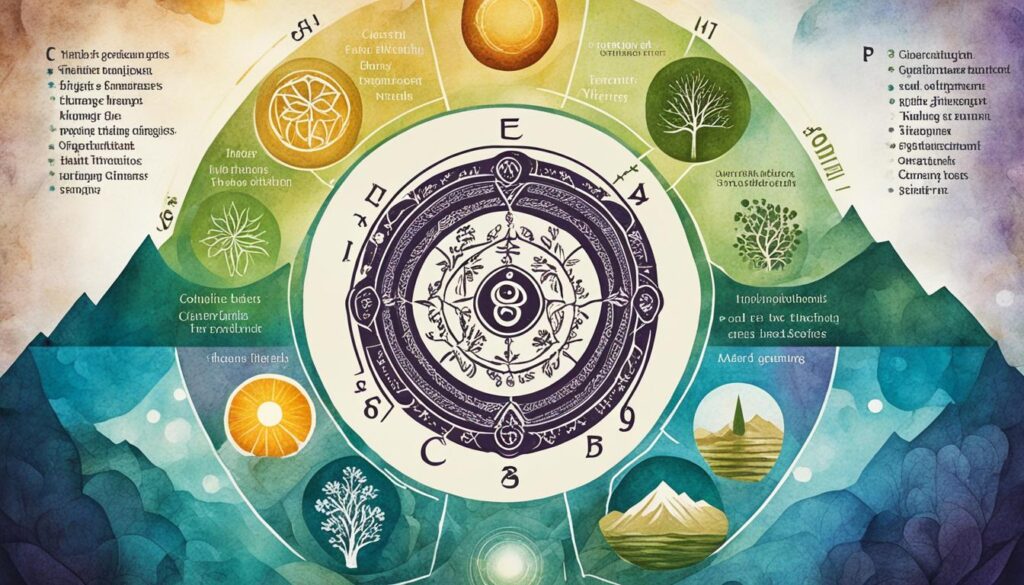Are you searching for a career that not only brings you success and prosperity but also aligns with your values and contributes to a more compassionate society? In a world driven by materialistic pursuits, it is increasingly important to consider the ethical aspects of our work, and the principles of Right Livelihood Buddhism offer profound guidance in this regard.
Right Livelihood Buddhism encourages individuals to embrace ethical work practices, make mindful career choices, and align their professional pursuits with their spiritual and moral values. By integrating the teachings of Buddhism into our work lives, we can find deeper meaning and fulfillment, while also creating a positive impact on the world around us.
Whether you are seeking a new career path or looking to infuse more purpose into your current job, exploring the wisdom of Right Livelihood Buddhism can be a transformative journey. Let’s delve into the principles, practices, and practical applications of this ancient philosophy, and discover how it can lead us to a more harmonious and fulfilling professional life.
Key Takeaways:
- Right Livelihood Buddhism provides guidance for ethical work practices and mindful career choices.
- Aligning your career with your values can bring deeper meaning and fulfillment to your professional life.
- Exploring the principles of Right Livelihood Buddhism can lead to personal and societal harmony.
- By integrating Buddhist principles into your work, you can contribute to a more compassionate and just society.
- Right Livelihood Buddhism offers a path to creating a career that is in alignment with your spiritual and moral values.
The Middle Path: Wisdom and Enlightenment
The Middle Path, also known as the Madhyam Marg, is a significant aspect of Buddhist philosophy. It originated from Prince Siddhartha’s quest for spiritual truth, where he realized the limitations of extreme indulgence and extreme asceticism. The Middle Path advocates for a balanced approach to life, transcending the duality of pleasure and pain. In the context of modern times, it offers a compass to navigate the complexities of a fast-paced society and helps individuals find harmony and peace in their career choices.
By embracing the Middle Path, individuals can avoid the extremes of materialism and find alignment with Buddhist principles in their work life. This balanced approach fosters a harmonious path to liberation, allowing individuals to cultivate wisdom and enlightenment while leading fulfilling professional lives.

Finding Balance in a Modern World
In today’s society, the pursuit of success often leads to imbalances in various aspects of life. The Middle Path offers a counterbalance, encouraging individuals to navigate their career journeys with mindfulness, compassion, and ethical decision-making.
Modern professionals can apply the principles of the Middle Path in their career by:
- Seeking a balanced approach: Rather than being consumed by materialistic pursuits or neglecting one’s responsibilities, finding a middle ground that allows for personal growth, financial stability, and a sense of purpose.
- Focusing on holistic well-being: Recognizing the importance of mental, emotional, and physical well-being alongside professional success. Prioritizing self-care, work-life balance, and nurturing healthy relationships.
- Cultivating mindfulness: Bringing awareness and intention to every aspect of work, whether it is decision-making, communication, or managing conflicts. Integrating mindfulness practices such as meditation and deep breathing to stay grounded in the present moment.
- Embracing ethical practices: Upholding integrity, honesty, and compassion in all professional interactions. Making conscious choices that align with Buddhist principles and contribute to the well-being of oneself and others.
The Middle Path offers a profound invitation to find harmony in the midst of a bustling career and navigate the complexities of the modern workplace with grace and wisdom.
The Eightfold Path: A Blueprint for Personal and Social Well-being
The Eightfold Path, a fundamental teaching in Buddhist philosophy, provides a comprehensive guide for personal and ethical development. Comprising eight components, this path serves as a blueprint for achieving personal and social well-being while leading individuals towards enlightenment and liberation from suffering.
Each step of the Eightfold Path offers practical wisdom and guidance, empowering individuals to live a life of wisdom, ethical conduct, and mental discipline. Let’s explore the eight components:
- Right View: Developing an accurate understanding of reality and the nature of suffering.
- Right Intention: Cultivating ethical and compassionate intentions towards oneself and others.
- Right Speech: Practicing truthful, kind, and non-harmful communication.
- Right Action: Engaging in ethical conduct and refraining from harmful actions.
- Right Livelihood: Choosing a profession or career that aligns with one’s values and promotes well-being.
- Right Effort: Cultivating wholesome mental states and letting go of unwholesome states.
- Right Mindfulness: Cultivating present-moment awareness, clarity, and non-judgmental observation.
- Right Concentration: Developing mental focus, tranquility, and deep concentration through meditation and mental exercises.

The Eightfold Path provides individuals with guidance on personal and ethical development, inviting them to embark on a transformative journey towards liberation from suffering. By embodying the principles of the Eightfold Path, individuals can cultivate wisdom, promote harmony, and contribute to the well-being of themselves and society as a whole.
The Essence of Each Aspect of the Eightfold Path
The Eightfold Path is a transformative journey that provides practical guidance for achieving personal and social well-being, fostering harmony, peace, and fulfillment in our lives. Each aspect of the Eightfold Path encapsulates invaluable insights that can shape our perspectives and actions, guiding us towards a path of wisdom and liberation.
Right View: Understanding Reality and Suffering
Right view forms the foundation of the Eightfold Path, offering a clear understanding of the nature of reality and the causes of suffering. By cultivating a deep comprehension of the impermanence, interconnectedness, and unsatisfactory nature of existence, we can free ourselves from delusions and align our perspectives with truth.
Right Intention: Cultivating Ethical and Compassionate Intentions
With right intention, we develop noble aspirations and cultivate ethical and compassionate intentions. By aligning our thoughts and motivations with the principles of non-harming, kindness, and empathy, we lay the groundwork for ethical conduct and harmonious relationships.
Right Speech: Truthful and Kind Communication
Right speech emphasizes the importance of truthful and kind communication. It encourages us to speak words that promote harmony, understanding, and the welfare of ourselves and others. By practicing mindful speech, we foster healthy relationships, build trust, and avoid causing harm through careless or hurtful words.
Right Action: Promoting Ethical Conduct and Non-Harming
Right action involves acting in ways that promote ethical conduct and non-harming. It encompasses refraining from actions that cause harm, such as killing, stealing, and sexual misconduct, and actively engaging in actions that cultivate goodness, compassion, and generosity in our interactions with others.
Right Livelihood: Choosing Careers Aligned with Values
Right livelihood encourages us to choose careers or professions that align with our values, promoting personal well-being and contributing to the greater good of society. It emphasizes the importance of engaging in honorable work that avoids harm and embodies the principles of ethical conduct and social responsibility.
Right Effort: Cultivating Wholesome Mental States
Right effort involves cultivating positive and wholesome mental states while also abandoning negative and unwholesome states. It encourages us to develop mindfulness, determination, and perseverance, enabling us to overcome hindrances and nourish the factors that lead to personal growth and well-being.
Right Mindfulness: Cultivating Present-Moment Awareness
Right mindfulness is the practice of cultivating present-moment awareness and deepening our understanding of our experiences. Through mindfulness, we develop a clear and non-judgmental awareness of our thoughts, emotions, and sensations, fostering inner clarity, insight, and wisdom.
Right Concentration: Developing Mental Focus and Deep Concentration
Right concentration involves training our minds to develop deep states of concentration and focus. Through practices such as meditation, we cultivate the ability to silence distractions, attain deep absorption, and develop heightened levels of concentration, leading to insights, tranquility, and liberation.
By understanding and embodying each aspect of the Eightfold Path, individuals can embark on a transformative journey towards personal growth, social well-being, and ultimate liberation. The Eightfold Path serves as a roadmap for creating a harmonious and fulfilling life, bringing us closer to inner peace and contributing to the well-being of society as a whole.

| Aspect of the Eightfold Path | Key Insights |
|---|---|
| Right View | Understanding the nature of reality and suffering |
| Right Intention | Cultivating ethical and compassionate intentions |
| Right Speech | Promoting truthful and kind communication |
| Right Action | Promoting ethical conduct and non-harming |
| Right Livelihood | Choosing careers aligned with values |
| Right Effort | Cultivating wholesome mental states |
| Right Mindfulness | Cultivating present-moment awareness |
| Right Concentration | Developing mental focus and concentration |
Conclusion
Right livelihood Buddhism offers a profound and relevant philosophy for navigating the complexities of modern life. Its teachings provide practical guidance for ethical work practices, career alignment with values, and mindful profession selection. By integrating the principles of right livelihood Buddhism into your life, you embark on a path of personal growth, spiritual awakening, and contribution to a more compassionate world.
The Middle Path and the Eightfold Path serve as guiding lights on this journey, offering wisdom, harmony, and fulfillment. The Middle Path encourages a balanced approach to life, avoiding extremes and finding harmony in your career choices. The Eightfold Path, with its eight components, provides a blueprint for personal and ethical development, leading to enlightenment and liberation from suffering.
As you embrace right livelihood Buddhism, you will experience a deep connection between your work and spiritual awakening. Your profession becomes a vehicle for personal transformation and a means to fulfill your ultimate goal of liberation. Let the timeless teachings of right livelihood Buddhism inspire and guide you as you transform your work life, contributing to a more harmonious and compassionate society.
FAQ
What is right livelihood Buddhism?
Right livelihood Buddhism refers to the practice of choosing a career that aligns with one’s values and ethical principles. It involves selecting a profession that promotes compassion, mindfulness, and ethical work practices.
How can I incorporate Buddhist principles into my career?
You can incorporate Buddhist principles into your career by choosing a profession that reflects your values, treating others with kindness and respect, practicing mindfulness in the workplace, and cultivating ethical work practices.
How can the Middle Path philosophy help me in my career?
The Middle Path philosophy emphasizes balance and harmony. By adopting a balanced approach to your career, you can avoid the extremes of overwork and burnout or laziness and stagnation, finding a path that promotes well-being and fulfillment.
What is the significance of the Eightfold Path in Buddhism?
The Eightfold Path is a fundamental teaching in Buddhism that provides guidance for personal and ethical development. It offers a comprehensive framework for living a life of wisdom, ethical conduct, and mental discipline.
How can I apply the Eightfold Path to my life and work?
You can apply the Eightfold Path to your life and work by focusing on cultivating right view (understanding reality), right intention (cultivating compassionate intentions), right speech (practicing kind and truthful communication), right action (engaging in ethical conduct), right livelihood (choosing a career aligned with your values), right effort (cultivating wholesome mental states), right mindfulness (cultivating present-moment awareness), and right concentration (developing mental focus).

